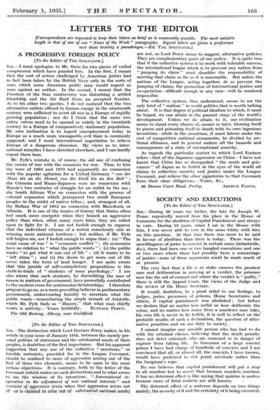LETTERS TO THE EDITOR
[Correspondents arc requested to keep their letters as brief as is reasonably possible. The most szsitah!e length is that of one of our "News of the Week" paragraphs. Signed letters are given a preference over those bearing a pseudonym.—Ed. THE SPECTATOR.] A PROGRESSIVE FOREIGN POLICY [To the Editor of THE, SPECTATOR.] must apologize to Mr. Stein for two pieces of verbal compression which have puzzled him. In the first, I meant that the sort of action challenged by American jurists had in fact been taken by the British Navy only in the sorts of wars which some American public men would regard as wars against an outlaw. In the second, I -meant that the Freedom of the Seas controversy was disturbing a settled friendship and the Air Raid Scare an accepted frontier. As to his other two queries, I do not contend that the two alternative outlets offered to human energy in the nineteenth century were sufficient to avert all war in a Europe of rapidly grOwing population ; nor do I think that the same two safety valves need to be opened so widely in the twentieth century to a Europe of comparatively stationary. population. My own inclination is to regard unemployment today in Europe as a much more manageable evil than is commonly supposed, and I want international negotiation to relieve Europe of a dangerous obsession. My views as to inter- national remedies I have sketched elsewhere, and I can hardly repeat them here.
Mr. Fyfe's mistake is, of course, the old one of confusing the causes of war with the occasions forwar. Thus, to him the wars of 1864 and 1870 had apparently no connexion with the popular agitation for a United Germany " von der Maas bis an die Memel, con der Etsek bis an den Belt" ; the Crimean and Russo-Japanese wars no connexion with Russia's two centuries of struggle for an outlet to the sea ; the South African War no connexion with 'the process of colonial expansion which juxtaposed two small European peoples in the midst of native tribes ; and, strangest of all, the Balkan War of 1912 no connexion with Macedonia or Albania. It is One of the ironies of history that States often feel :much more energetic when they launch an aggressive pOlicy than. when, often many years later, they are called upon to fight for it. I am not foolish enough to suppose that the individual citizens of a nation consciously aifn at winning more national territory ; but neither, if Mr. Fyfe will forgive me, am 'I foolish enough to argue that : (a) " The usual cause of war " is " economic conflict " ; (b) economics have no relation to " what the public wants " ; (c) the public wants " to get what it can out of life" ; (d) it wants to be "'left alone " ; and (e) the desire to get more Out of life newer takes the form of land hunger. I am quite aware that` this jumble of self-contradictory propositions is the 86610in-trade of " students of mass psychology." I am also atrare that such students, by discrediting the uses of reason in matters of government, have powerfully contributed to the-modern craze for sentimental dictatOrthips. I therefore propose fa go on, as a mere grovelling believer in parliamentary goVernment, endeavouring humbly to ascertain what the public wants—remembering the simple remark of Aristotle, which Mr. Fyfe finds so " illusory," that what man chiefly














































 Previous page
Previous page